Recent Fire Damage Posts
How Clean Your Dryer Vents in 3 Easy Steps
2/18/2024 (Permalink)
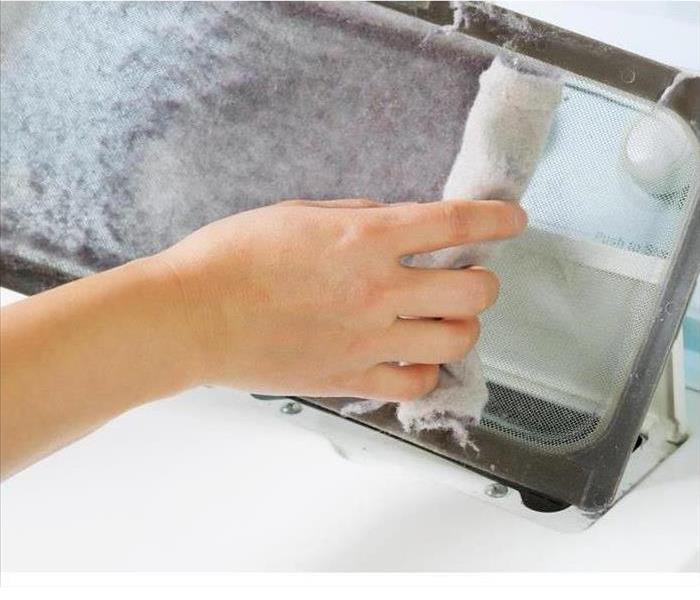 Unblocking the lint screen is the most important step towards preventing a dryer fire
Unblocking the lint screen is the most important step towards preventing a dryer fire
Basic Steps In Maintaining A Dryer
A well-maintained dryer offers many benefits to its owner. The heating elements last longer, clothes dry faster and you get to avoid a lint fire. It is also worth noting that dryer maintenance is a DIY level project that requires only a few minutes to complete.
Here are the basic steps to maintaining a dryer that every homeowner in Edmond, OK should know
Cleaning the Lint Screen
Doing a deep clean of the vents
Completing a deep clean of the interior
1. Cleaning the Lint Screen
Unblocking the lint screen is the most important step towards preventing a dryer fire. Grab the screen and pull it out until it’s fully extended or entirely removed. Then use soap and water to clean it until there’s no more blockage. While you’re at it, vacuum the empty lint trap to get rid of any debris before inserting the lint screen. This process should be repeated after every use to avoid fire damage.
2. Doing a Deep Clean of the Vents
First of all, disconnect the dryer from power then use a screwdriver to loosen the clamps that attach the vent to the exhaust. Use a cleaning brush to remove the lint balls in the pipe. Then snake the wall vent before reassembling the appliance.
3. Completing a Deep Clean of the Interior Dryer
Clean the dryer interior every six months to prevent nasty surprises. You’ll need to unplug the dryer then open the back panel so you can vacuum the interior. The idea is to rid of any dirt, lint, and debris that may affect the machine’s performance or cause a lint fire.
There’s nothing more painful than realizing you could have easily prevented a house fire. A lint fire is one of those situations that can be avoided by regular DIY maintenance. So, make dryer cleaning a habit and also share this info with friends and family.
3 Awesome Alternatives to Candles
8/22/2023 (Permalink)
 You do not need to sacrifice your favorite scent or aesthetic for safety when you choose candle alternatives for your home in Luther, OK.
You do not need to sacrifice your favorite scent or aesthetic for safety when you choose candle alternatives for your home in Luther, OK.
The power of a scent is indisputable, some aromas relax you while others transport you to another time and place. As you light a scented candle at your home in Luther, OK, you wonder if the benefits of a lit candle outweigh the fire hazards it poses. Candle fires are a common cause of fire damage in homes, especially around the holidays when candles are commonplace. When homeowners leave candles unattended or in close proximity to towels, curtains or other fabrics the risk of fire increases further. Consider these three candle alternatives to safely enjoy a fragrant home all year round.
1. Battery Operated
There are a wide variety of flameless candles powered by batteries. Some appear physically identical to candles, which is an excellent choice if you enjoy the visual appeal of candlelight. Others use scented wax to provide the olfactory sensation you desire. For an original look, there are battery-powered bases with scented decorative shades as well.
2. Warmers
Continue to enjoy candles without lighting the wicks by using a candle warmer. A lamp light over the candle melts the wax and disperses the scent through your home. Other candle alternatives include oil warmers, which releases fragrances through a battery or electrical source heating scented oil. Wax warmers are similar, by which a heated foundation melts scented wax.
3. Diffusers
Another flameless option is to diffuse a scent, such as by placing reeds in a base of aromatic oil. There are also many choices of battery or electrical water diffusers to use with any essential oil you desire.
You do not need to sacrifice your favorite scent or aesthetic for safety when you choose candle alternatives for your home in Luther, OK. If you do use a candle, never leave it unattended or place it too close to flammable materials. Should a candle fire occur, immediately leave the house and call 911. Contact a fire restoration specialist and your homeowner’s insurance company to begin the process of restoring your home. For more information, visit http://www.SERVPROedmond.com/.
When To Do Maintenance on Your Furnace
7/26/2023 (Permalink)
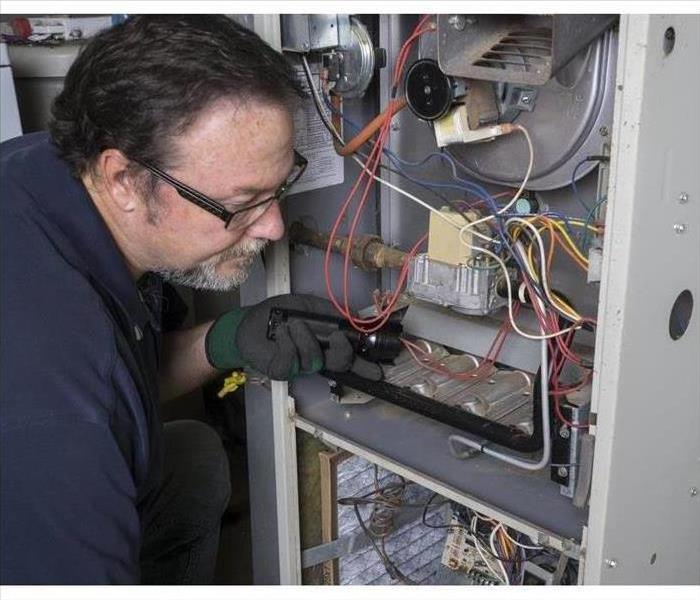 Furnace repair
Furnace repair
Preventative fire cleaning on your home furnace in Arcadia, OK, is important to ensure it functions correctly and doesn’t cause fire damage. While many people suggest hiring a maintenance professional to inspect annually, there are some things you can do yourself as well to ensure you system runs efficiently.
Replace Filters Regularly
Dirt can be a big problem for heating and cooling systems, by lowering efficiency and burning extra fuel. Keep the system clean by vacuuming around the unit regularly and changing the filter monthly or whatever time-frame is recommended by the manufacturer.
Leaving old filters to sit for too long will add stress to the compressor and can eventually result in mechanical failures. Not only that, the dirt and debris will get recirculated through your home which can cause allergies and disease. It’s also important to do additional fire cleaning on heaters, radiators, and warm-air registers, while also ensuring they’re not blocked.
Maintenance Before Cold Weather
Many homeowners call a professional to do a yearly inspection and fire cleaning on their furnace before the heating season to confirm the system is clean and performing in the most efficient way possible. Here are a few steps you can take yourself to keep your bills low while staying warm:
Calibrate the thermostat. The correct calibration can be lost from excess dirt or being moved around. A furnace maintenance professional can check this annually, or you can replace it with a computerized one.
Clean and adjust the burners to improve efficiency, and check for any rust accumulation.
Reverse ceiling fans to a clockwise rotation to help push warm air down, especially if you have tall ceilings.
Seal any air leaks and all air ducts, especially in the attic or crawl spaces. Metal tape and insulation can temporarily save an aging duct system.
It’s good to get into the habit of allowing a professional to service your furnace once per year. Waiting until the end of the heating season (the off-season) may give you faster service at a slight discount. If you have endured some home damage due to a furnace issue, smoke cleaning and remediation services are available that can usually clean up the mess to almost as good as new.
What To Expect After a Fire in Your Home In Your Edmond, OK, Home
6/22/2023 (Permalink)
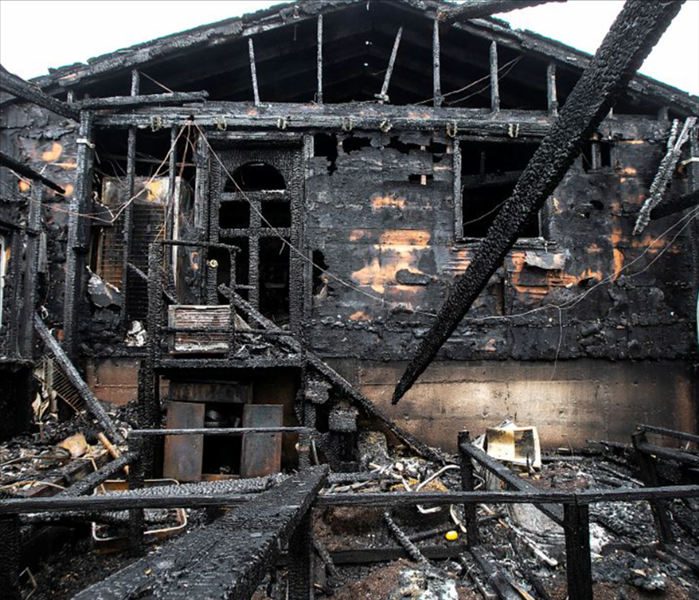 Aftermath of inside home fire
Aftermath of inside home fire
A home fire can cause tremendous upheaval for homeowners and family members. Once the emergency has subsided, the focus will begin to shift to fire damage cleanup and restoration. Before cleanup can begin, some safety concerns will be addressed. Here is what you can expect.
Safety Inspection
After the fire is extinguished, fire responders will inspect and assess the structure for safety. They will look at three primary areas to determine whether it is safe for cleanup crews to enter.
- Safety Hazards – Hazards will be identified and may need to be removed from the structure.
- Structural Integrity – The building’s main construction will be inspected for stability, and dangerous areas will likely be cordoned off until structural integrity is restored.
- Electrical System – The electrical will likely be disconnected until the water from the firefight can be removed.
The Inspection phase of the process establishes that your home is stable enough for you to enter it with a fire official.
Fire and Smoke Damage Survey
If you are cleared to enter your home, you will have a walk-through to view the fire damage and ask questions about the fire damage restoration process. This important step can prepare you for working with the professionals that will assist you with next phase.
Helpful Professionals
With an overview of the damage, you can contact your insurance agent to inquire about your coverage. Your agent will likely be able to refer you to a local fire remediation service. Fire cleanup is a complex process and requires specialized training and methods so your property can be cleaned, dried and restored as safely as possible.
Experiencing a fire in your Edmond, OK, home can bring significant disarray to your life. In the first few hours after a fire, you can rely on emergency responders, your insurance agent and your fire damage cleanup crews to help you move forward. One step at a time, they will ensure your home and your belongings—and ultimately your peace of mind—are restored “Like it never even happened.”
What can be salvaged after a House Fire
2/22/2023 (Permalink)
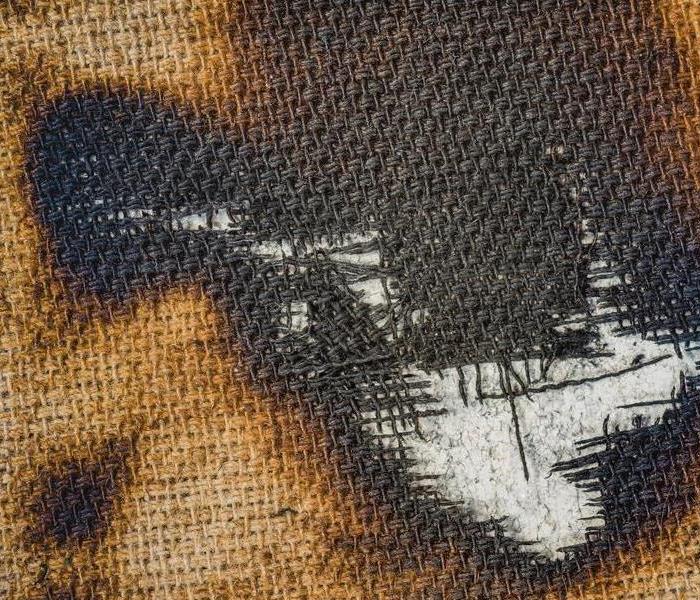 There still is the potential to salvage content after a fire, give SERVPRO a call immediately.
There still is the potential to salvage content after a fire, give SERVPRO a call immediately.
Fires are never pleasant to deal with, and they can be especially devastating in a home. Fires destroy not only the items in your home but also your sense of security and comfort. There is hope for recovering from a fire that has destroyed at least some items within your home. Professional restoration companies can salvage many items after a house fire.
Prevent the Disaster of a Fire in your Home
While there is no way to entirely prevent the disaster of a house fire, there are many ways you can increase your safety and reduce the chances of your home becoming involved in one.
Be sure you have working smoke detectors in every room of your home. Replace batteries at least once a year or whenever they become weak, according to the manufacturer's instructions on each device.
Stay away from open flames when cooking or handling flammable materials such as gasoline, paint thinner and cleaning solvents — even if these items are contained in sealed containers. Keep children out of areas where these chemicals are stored!
Don't overload electrical outlets with too many appliances plugged into them at one time. Keep extension cords away from areas where people walk so they aren't tripped over. Use caution with electrical equipment while doing construction work around your house. All these things contribute to potentially dangerous conditions inside homes that could lead up to fires breaking out later on down the road!
What is Salvageable?
There are a few items that can be salvaged after a house fire. While you may need to replace most of the contents of your home, there are some things that can be cleaned and restored to their former glory. It is important to consult a professional restoration company if you want these items salvaged properly, as they will know what cleaning methods will best preserve them.
If there are any items that have sentimental value in your home, such as photographs or keepsakes, it is crucial that you save them immediately after the fire has been put out. Even if they seem damaged beyond repair at the time, there may be hope for salvageability later on when they are properly cleaned and preserved by trained professionals who work with damaged goods all day long!
Structure and Materials
A structure fire in an older home with wooden floors and walls may result in a home that's not safe to enter or even tear down for materials. In contrast, a kitchen fire might only damage the cabinets, leaving them safe for use again once they've been cleaned up.
The materials used in construction also factor into how much can be salvaged from a house after a fire. A structure made entirely out of wood might not be salvageable at all if it experiences heavy flames for long enough.
Use a Professional
A professional restoration company will help salvage many items after a house fire. A professional restoration company can help you get your home back to normal, and they can also help you get your life back to normal. If you are in a situation where your home has been damaged by fire, it is important to understand what you can salvage and what needs to be replaced. A professional restoration company can help salvage many items after a house fire.
5 Leading Causes of Home Fires
8/28/2022 (Permalink)
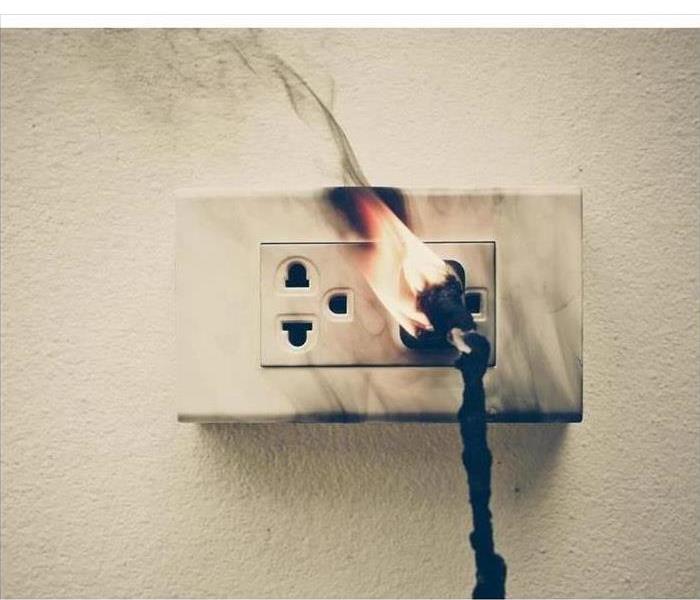 Reduce the risk of electrical fires by plugging devices into appropriately powered outlets
Reduce the risk of electrical fires by plugging devices into appropriately powered outlets
Five Common Fire Causes
Home fires typically start when high heat or open flame indoors come into contact with combustible materials. Once a home fire ignites, it burns combustibles and can cause major damage to a residence in Hibsaw, OK. Here are five of the most common fire causes to be aware of in order to reduce the risk level of your home.
1. Cooking
The most common causes of fires at home is cooking. Cooktops and ranges with electrical heating coils or open gas flames can start a fire after being turned on accidentally or heat up hot oil to the auto-ignition point.
2. Heating
Heating equipment such as electric or gas furnaces and space heaters are common home fire risk factors. Have a furnace inspected by an HVAC professional at least once a year. Choose space heaters with safety features and only operate while attended and connected to a Ground-fault Circuit Interrupter outlet.
3. Electrical
Frayed or exposed wires anywhere in a home may cause a fire to start. Reduce the risk of electrical fires by plugging devices into appropriately powered outlets and avoiding overloading circuits or short-circuiting.
4. Open Flame
Any form of open flame poses an elevated risk of fire, whether on a cooking range, in the form of lit candles or a blazing fireplace. Always stay alert and pay close attention to any fire indoors, including cigarettes.
5. Chemicals
Improper chemical storage is a common factor in fires. In many cases, chemicals combust and necessitate more extensive fire cleaning and restoration.
While it is impossible to guarantee that a home fire will never take place in Hibsaw, OK, being aware of common fire causes can help homeowners make safer decisions. A household should have the right number of fire alarms and classes of extinguishers on hand. Store fire safety equipment in locations that are convenient for putting out fire.
The Necessity of Security Fencing After a Commercial Fire
7/30/2022 (Permalink)
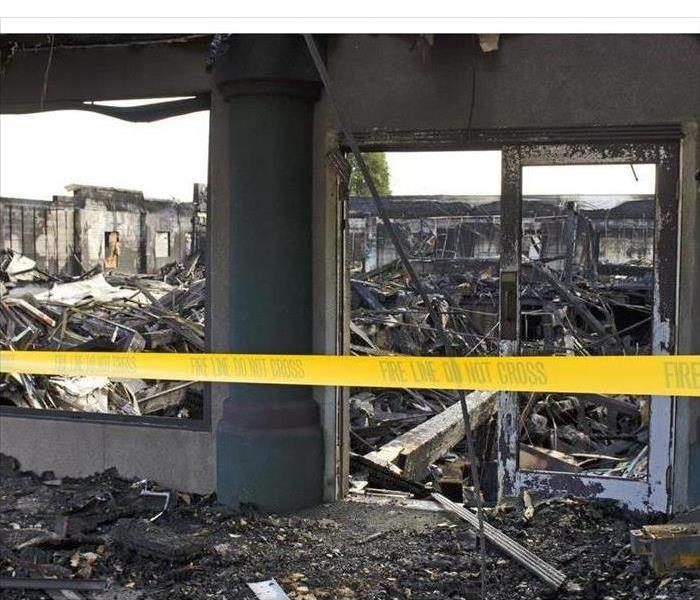 Security fencing after a fire in an Oklahoma Christian University, OK building
Security fencing after a fire in an Oklahoma Christian University, OK building
Security Fencing After a Commercial Fire
Fire loss is hard to comprehend for a business owner, especially the suddenness and urgency of it. Therefore, while an owner's mind should be on protecting the surviving structure and merchandise, they sometimes struggle to consider additional expenses, like a security fence. However, any disaster restoration service in Oklahoma Christian University, OK, can attest to the benefits of fencing, especially in three specific ways.
1. Protects Insurance Claims
A fence can protect your insurance claim. After a fire, you will want to protect your property from further loss, which most insurers expect from policyholders. Putting up a fence and utilizing mitigation services for boarding up damaged windows and doorways or covering holes with tarps are all excellent ways to protect your facility from further damage.
2. Limits Access
Limiting access to your facility should be your primary concern after a fire. Keep in mind that any person who enters your property, even illegally, is your responsibility. If someone enters and is injured, then you are liable. Putting up a security fence can help reduce that liability risk. Also, fences help to limit the amount of wildlife that may find their way into your property.
3. Adheres To Insurance Guidelines
What are your insurance policy guidelines in the event of a fire? Most companies expect their clients to do everything they can to prevent further loss. While many business owners only focus on boarding up openings and vulnerable areas, they should also consider fencing as the preferred way of preventing further damage due to vandals. However, to understand precisely what your insurance company expects, contact your agent for specific guidelines.
Do you think that a security fence is necessary after a fire? Have you spoken with your insurance company to understand your obligations as a business owner? Even if fencing isn't a requirement of your insurance policy, consider talking to a fire restoration service about the overwhelming benefits.
Microwave Maintenance Tips
6/6/2022 (Permalink)
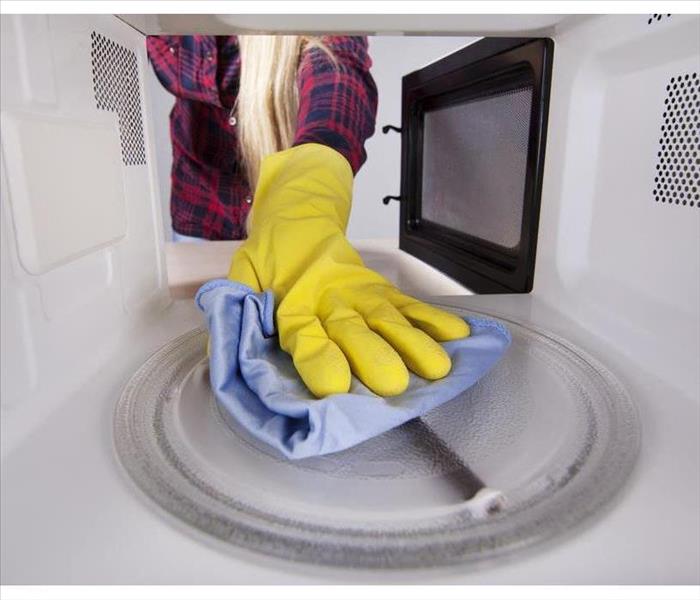 The best way to take care of it is to wipe down the inside after every use.
The best way to take care of it is to wipe down the inside after every use.
Microwave Maintenance Tips
When you reheat last night's dinner, delicious aromas fill your home in Waterloo, OK. However, if you detect a smoke smell when you activate the appliance, it probably needs some attention. There are several things you should be doing on a regular basis to maintain your above-range oven.
Microwave Cleaning Strategies
It doesn't take long for the inside of the appliance to get dirty. Sauces and other foods often splatter the walls. The best way to take care of it is to wipe down the inside after every use. Not many homeowners want to take the time to do this, though. Instead, you can steam the inside on a weekly basis using substances you probably already have in your kitchen:
Fill a glass bowl with water and add a few tablespoons of each acid to the mix. Heat for a few minutes and then let it sit with the door closed for a few more. When you open it, all you have to do is wipe down the interior surfaces. The food particles and associated smoke smell are gone!
Above-Range Filter Changes
If your appliance does not vent to the outside, you need to change your charcoal filter on a regular basis. Fire restoration experts recommend that you change the filter at least every six months. You should also wipe down the vent grill before you add the new filter to remove any grease that has accumulated.
Lightbulb Swaps
An above-range appliance offers convenient lighting for your cooktop. This feature is only effective if you replace burnt-out bulbs. Keep a stock of them in your maintenance supplies so that you can switch them out efficiently when needed.
You don't necessarily have to buy a new appliance if you notice a smoke smell when you use it. It's probably just a sign that it needs more frequent maintenance.
3 Things to Do About Roof Damage After a Fire
3/21/2022 (Permalink)
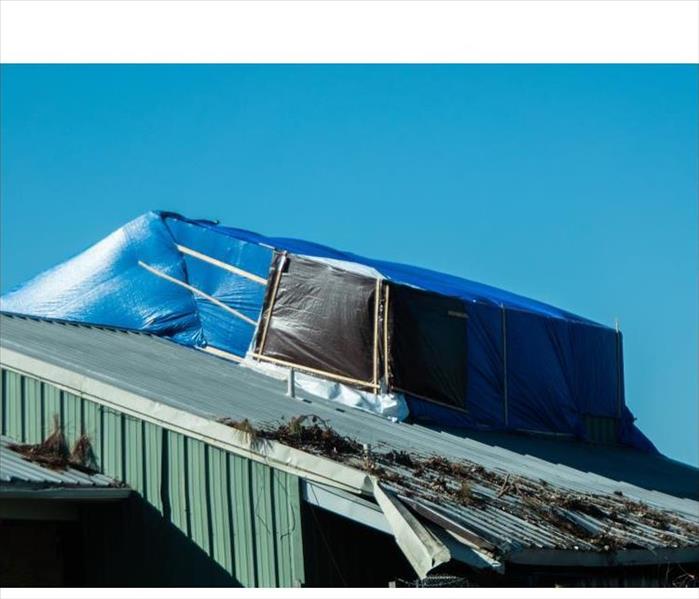 Protect your roof with a tarp to avoid further harm.
Protect your roof with a tarp to avoid further harm.
Roof Damage After a Fire
Discovering that you have roof damage during the fire cleanup process can leave you wondering how to properly address it. In order to protect your business in Edmond, OK, from further damage, there are some important steps you need to take. Here are a few tips to help you take care of damage to your commercial building’s roof.
1. Make an Insurance Claim
Filing an insurance claim is a good idea if your roof has been significantly harmed as a result of fire damage. Be sure to document all signs of damage on your commercial roof in order to provide concrete evidence of the damage. Providing sufficient proof of your loss can also be useful if you plan to show the evidence to a roofing company that can help cover up the damage.
2. Have Tarp Placed on Roof
Covering up the fire damage with tarp can help protect your roof from further harm and ease your fire cleanup efforts. When you utilize tarp services, you can prevent substances such as rain and debris from seeping through your roof and causing additional damage to your building. Rain and snow in particular can cause serious water damage if they accumulate on your roof, so keep these points in mind during the roof repair process.
3. Give Your Roof the Proper Treatment
The care that your roof needs depends on what caused the damage in the first place. If the problem is residual soot, then you may need to address discoloration on your roof caused by soot particles. Have your roof inspected as soon as possible in order to determine exactly how to navigate the fire cleanup process and repair your roof.
Taking care of roof damage in Edmond, OK, can be a less stressful process when you have valuable help and support. Be sure to call cleanup and restoration services to facilitate the roof repair process and have your business return to normal in no time.
3 Steps To Smother a Grease Fire
2/23/2022 (Permalink)
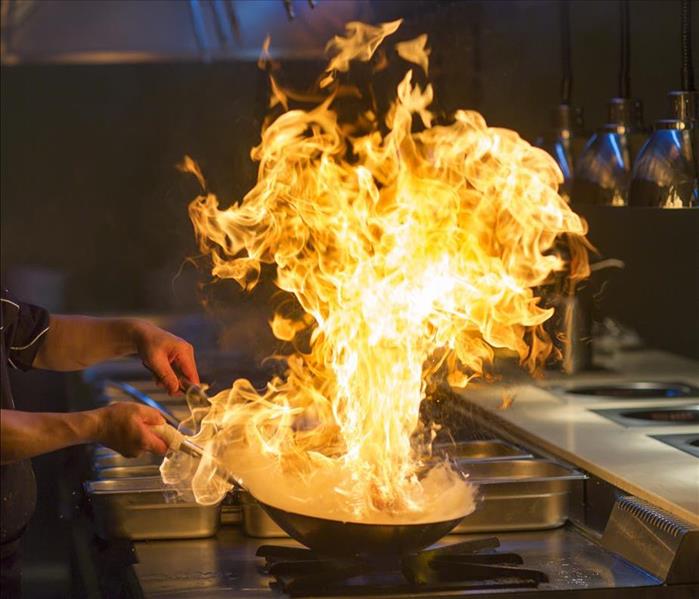 Grease fires can burn hotter than most other types of kitchen fires.
Grease fires can burn hotter than most other types of kitchen fires.
Smothering a Grease Fire in 3 Easy Steps
Grease fires can burn hotter than most other types of kitchen fires. It is important to know how to safely extinguish these fires, as using a pressurized fire extinguisher may actually cause this type of fire to spread. Here are the three steps necessary to safely smother a grease fire.
1. Turn Off the Heat
The first step to handle smoking grease or fire is to turn off the source of heat. This can prevent grease from becoming even hotter. Do not attempt to move a pan or pot off of the burner, as motion can intensify the fire.
2. Smother the Flames
There are two effective ways to quickly smother flames. It is a good idea to keep baking soda and salt handy if you are cooking with large amounts of grease. Baking soda consists of sodium bicarbonate, which releases carbon dioxide. Salt draws heat out of grease to limit its combustibility.
An intense grease fire will draw in oxygen through convection and may resist this smothering effect. Limit the supply of oxygen by immediately covering the pot or pan with a metal lid, cookie sheet, or another pot or pan.
3. Make Sure the Fire Is Out
Monitor the situation to make sure that a fire is not spreading. Wait at least 20 minutes for grease to cool before checking the condition under the cover. Lifting a cover too quickly can introduce a surge of oxygen that may cause a fire to reignite.
These steps should make it possible to safely contain a grease fire, which will limit safety risks and property damage. In the event of a fire that is too intense to smother, close the doors leading to the kitchen and evacuate. Any type of fire can result in extensive damage. If this occurs, contact a fire cleanup and restoration service located in Oak Tree, OK.
5 Steps to Fire Safety
11/15/2021 (Permalink)
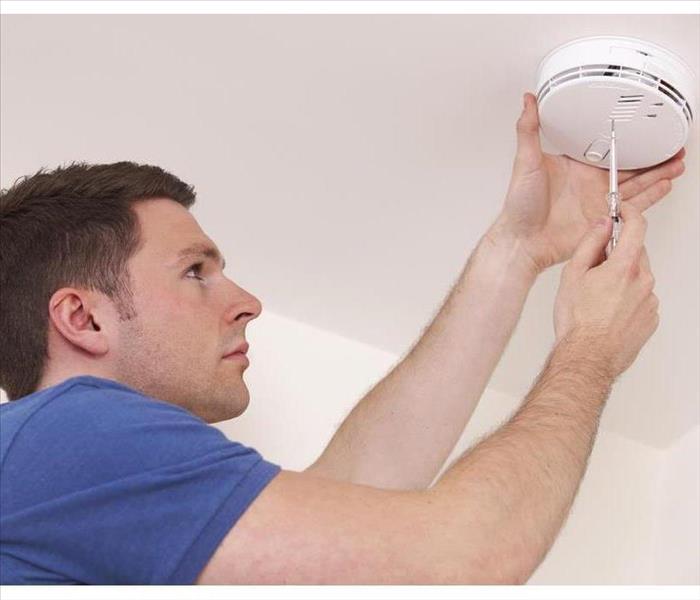 Install and maintain smoke detectors.
Install and maintain smoke detectors.
Fire Safety for Your Home
Protecting your home in Luther, OK, from fire damage is an essential safety precaution. It's important to have a fire escape plan, however, just in case your home does catch fire. The American Red Cross gives several tips on how you can prepare for a fire emergency in your home.
1. Make a list of emergency contact numbers. The emergency number 9-1-1 is pretty easy to remember, but you will also need to contact your insurance company and fire restoration specialists pretty soon after you vacate your home. Having these numbers stored on your phone or in your backup files online ahead of time can significantly minimize the amount of time it takes to process the damage.
2. Have an emergency escape plan. Everyone in the family should be able to name two ways to get out of every room in your home. That way, if one path is blocked, you can still get to safety. Talk about the plan with family members to ensure everyone understands it.
3. Install and maintain smoke detectors. Your fire escape plan will likely be put into action by the sound of a smoke alarm. Install a detector in a common area on every level of the home and one outside each sleeping area. Test them monthly to make sure they're operational.
4. Establish a meeting point. Decide as a family where you will meet if you get separated after the fire. It could be a neighbor's house or a well-lit convenience store down the block. Everyone should be able to get there quickly on foot.
5. Practice the plan. At least twice a year, have a family fire drill. Go through the motions of evacuating your home as if it were actually on fire so that everyone can get a feel for what the process may be like if it ever becomes necessary.
A fire escape plan is a vital part of your family's safety. While you may never need it, but you'll be glad to have it if you do.
Prevent Lint Fires by Cleaning Your Dryer Vent
10/29/2021 (Permalink)
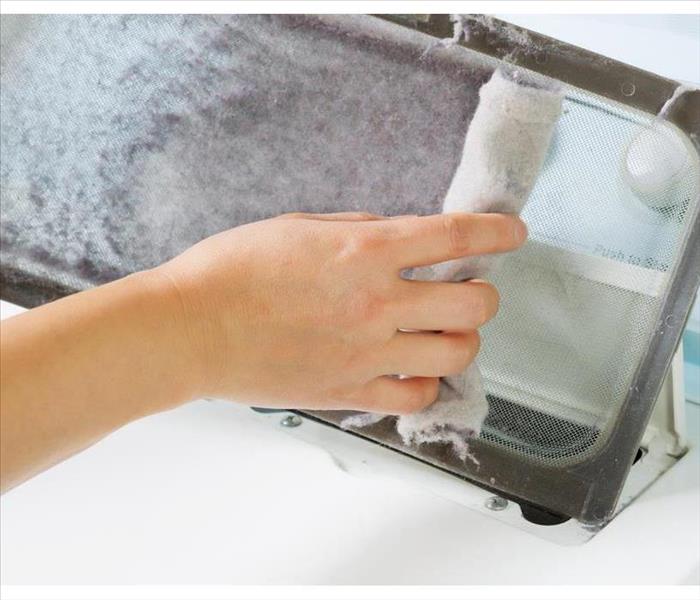 You can simply avoid a lint fire by cleaning your vent on a regular basis.
You can simply avoid a lint fire by cleaning your vent on a regular basis.
Clean Your Dryer Vent to Prevent Lint Fires
A home clothes dryer fire can be an expensive disaster. There are 2,990 such fires reported in the U.S. annually. These preventable fires cause over $35 million in property damage each year. You may be certain that this could never happen to you, especially if you have top-of-the-line equipment, but your dryer vent could put you at risk. Being proactive by learning how often your dryer vent should be cleaned will keep your home in Oklahoma City, OK, safe. Here are three tips for properly maintaining a safe dryer.
1. Be Consistent
You can easily prevent a lint fire by cleaning your vent often. This simple task can save you a lot of money and heartache. Make it a habit to check the vent every time you do a load of laundry. It is also important to not neglect the back of the dryer, as it is an easy place for lint to build up over time. If cleaning by hand is not doing the trick, use a nylon brush for a more thorough clean.
2. Take the Extra Steps
It is important to take every precaution in regards to keeping your home safe. Less frequent but more intensive dryer cleaning tasks such as snaking the dryer exhaust every three months and regularly having the dryer professionally cleaned are important. It is also a good idea to unplug your washer and dryer if you will be away from your home for more than a week. You should have the number of the nearest fire restoration company on hand in the event that a fire does occur.
3. Check Outside, Too
Preventing a lint fire is not exclusive to indoor tasks. Precautions should be taken outside as well. Make sure that elements such as rain and snow do not damage your dryer by putting a covering on outside wall dampers. It is also important to make sure that outdoor vents do not get blocked by insect or animal nests. Use these tips to reduce the chance of a lint fire in your Oklahoma City, OK, home.
Fire Damage Cleanup in Edmond
9/27/2021 (Permalink)
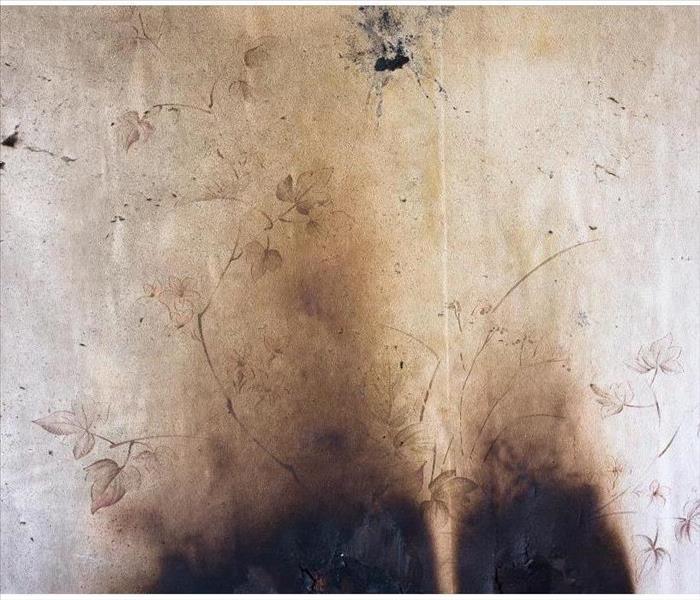 Once your home has been cleaned and repaired, it will be safe for you and your family to return.
Once your home has been cleaned and repaired, it will be safe for you and your family to return.
Thousands of homeowners will experience fire damage to their homes this year. This can be a stressful time, but thankfully there will be people to help get them through the process of restoration. The fire restoration process for residential homes in Edmond, OK, begins with contacting the insurance company and then calling a professional restoration company. Homeowners should never attempt cleanup themselves due to the presence of hazards such as structural damage and the possibility of exposed electrical wiring.
When the restoration company arrives they will assess the damage to determine what can be saved and what needs to be removed. They will board up any openings to the home and cover any openings in the roof.
Smoke Damage
There will likely be smoke damage throughout the home, even if the majority of the home was saved. Smoke can travel through the smallest openings, including vents and outlets. It can affect paint, flooring, and belongings, even when they weren't in the area of the fire. The restoration company will use special equipment in the smoke cleaning process. This will also remove any soot damage from the surfaces of your home, including the walls and ceilings.
Fire Damage
The areas of your home damaged by fire will require the removal of damaged materials and structures. Any items that are restorable will be cleaned using special techniques that also remove the smoke smell. The final part of the restoration process will be getting your home back to its pre-damage condition. This will include construction, installation of materials, such as flooring, and new paint.
Once your home has been cleaned and repaired, it will be safe for you and your family to return. There should be no sign of the damage from the fire or smoke damage to the surfaces of the home. Experience a fire is a traumatic event, so always reach out to friends, family, and professionals who can help get you through it.
House Fire Cleanup
7/29/2021 (Permalink)
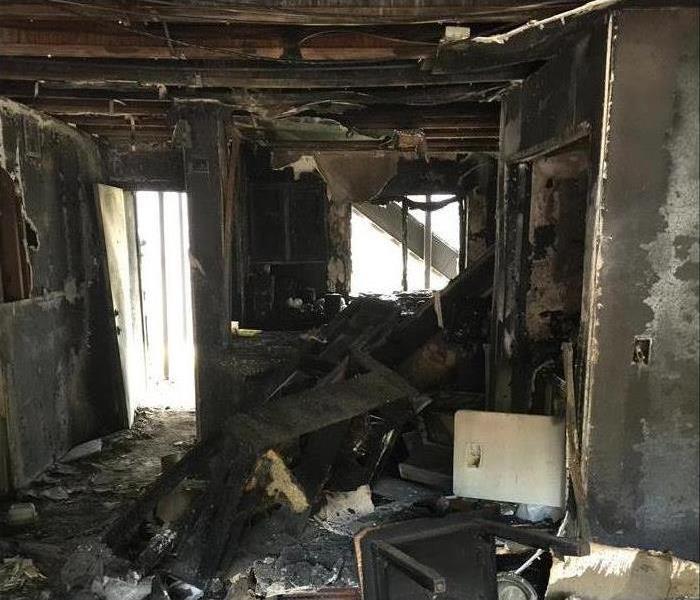 Smoke damage and soot damage require the specialized equipment and techniques that professionals use to treat walls, ceilings and any other surfaces.
Smoke damage and soot damage require the specialized equipment and techniques that professionals use to treat walls, ceilings and any other surfaces.
Cleaning Up After A House Fire
A house fire in Waterloo, OK or any other small town, big city or sprawling suburb, could range from a nuisance to a nightmare, depending on the severity of the blaze. A fire of any size is likely to cause smoke damage, but it is reassuring to know that professionals can work quickly to get you back to your comfortable routines more quickly than you might expect.
Remediating Smoke and Soot
Fires can cause many kinds of damage to a house. After seeing to everyone’s safety, the next priority is to assess the type and extent of the damage and to secure the structure, all of which can be handled at any time of day or night by professionals.
- Repairing structural damage to the house may require partial demolition.
- Water removal will usually begin quickly and progress to the use of air movers and dehumidifiers to completely dry the environment.
- Smoke damage and soot damage require the specialized equipment and techniques that professionals use to treat walls, ceilings and any other surfaces that have been compromised.
- Structures and items that are restorable will usually receive special cleaning, such as steam cleaning of carpets and upholstery and dry cleaning of other fabrics such as window treatments. Fogging equipment is highly effective in smoke cleaning and can be part of the remediation process.
- Restoration work may entail replacement of drywall and carpets or other types of flooring, depending on the extent and type of damage.
- Painting walls and ceilings can restore the beauty of your home and prepare for the return of your furnishings and treasured belongings.
A home is a sanctuary for you and your loved ones, and the thought of being displaced by fire can certainly be nerve-wracking. But with today’s technological expertise, reclaiming your home from smoke damage and soot is more easily achievable than it has ever been.
Cleaning up Soot and Smoke Damage at Home
6/29/2021 (Permalink)
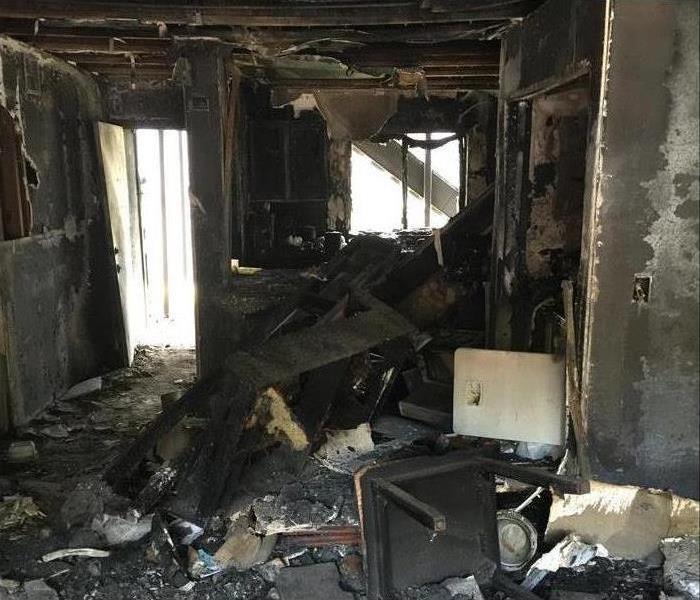 Severe fire damage to a house in Arcadia, OK.
Severe fire damage to a house in Arcadia, OK.
How Do You Fix Soot And Smoke Damage In A House?
House fires can be devastating for any number of reasons. Even fires that were put out before they could cause extensive damage or harm can actually result in several problems, including damage from smoke. Smoke can harm many different items in the house and typically leaves a strong, sour smell behind even long after the fire has gone out. Cleaning up the soot and smoke damage from an Arcadia, OK, house fire can take a long time, but you can start with these steps.
- Assess the degree of smoke and soot damage to the home.
- Contact professional cleaning services.
- Continue with home recovery efforts.
Getting the Right Help
Because smoke is such a powerful smell, professional service providers are often required to thoroughly remove it. Professional cleaning firms in Arcadia, OK, often offer special smoke cleaning services. Contact your nearest cleaning firm and ask them about smoke damage cleaning rates. You may find it helpful to compare rates among multiple service providers.
Once you have decided on a provider, arrange for them to visit your home. They may begin by cleaning soft surfaces to remove the heavy, smoky smell. Curtains, bedding, furniture, carpet, and upholstery can all trap and hold smoke smells; often this cannot be removed by a simple DIY scrubbing.
Cleaning your home’s structure can also be a challenge to complete on your own. Professional home cleaners, as well as service providers specializing in fire restoration, may be able to help you restore the structure of your home by removing soot damage from various surfaces. The composition of soot depends on what was burning and for how long; some surfaces can be easily wiped clean while others could require deeper cleaning in order to be fully restored.
Recovering From a Fire
Cleaning is typically an important part of recovering from a house fire. Removing smoke damage and soot can be accomplished with the help of experienced professional restoration firms operating in your area.
How To Keep Your Gas Grill Clean
3/18/2021 (Permalink)
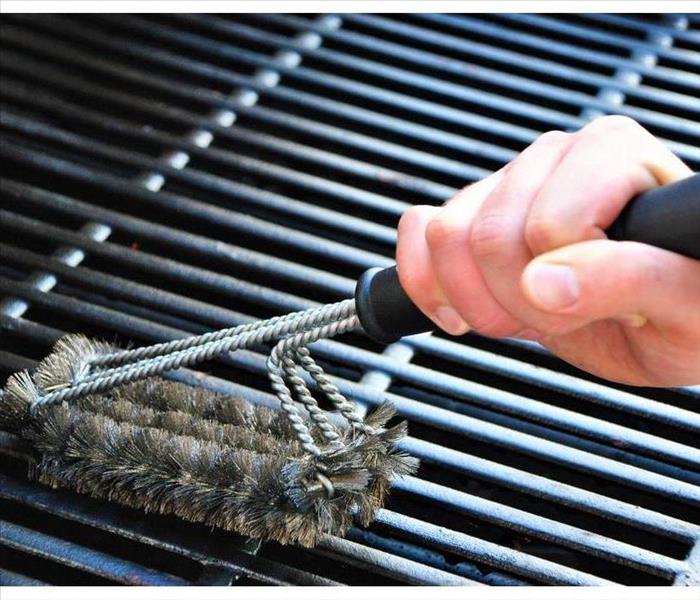 Clean this with the grill brush every month or so during the grilling season.
Clean this with the grill brush every month or so during the grilling season.
Keeping your gas grill clean will extend its life and keep it working well. A grill cleaning also reduces the chance that you will start a fire at your home in Oklahoma City, OK. Call a fire restoration service if you need help with repairs after a fire.
Steps To Keep Your Grill Clean After Each Use
There are a few steps you should follow every time you use your grill.
Burn the food off by keeping the grill on high for 15 minutes after you have cooked your food. This turns any food residue into ash, which is easier to clean. Turn off the grill and allow it to cool until it is moderately warm.
While still warm, scrub the grates with a steel brush. If you have difficulty removing the ash particles, remove the grates and soak them in warm, sudsy water for a few minutes. Make sure to rinse and dry them thoroughly before putting them back in place.
Lightly spray the grates with vegetable oil to prevent them from rusting.
Maintenance Procedures To Perform Periodically
Set up a grill maintenance schedule for a few additional steps. This grill cleaning frequency depends on how often you use your grill.
The burner protectors keep grease and dirt away from the burners. To avoid a grease fire, the protectors should be cleaned every few times you use the grill. Remove them and soak them in warm, soapy water. Rinse and dry before putting them back in place.
The burners are located under the burner protectors. Take a soapy sponge and clean off the burners. Then rinse them with a wet rag. The plates, located under the burners, can be pulled out between the burners and cleaned with the grill brush. Below the burners and plates are the bottom tray. Clean this with the grill brush every month or so during the grilling season.
A grill cleaning will keep your grill working well for many years.
3 Tips for Dealing With Smoke-Damaged Items
11/4/2020 (Permalink)
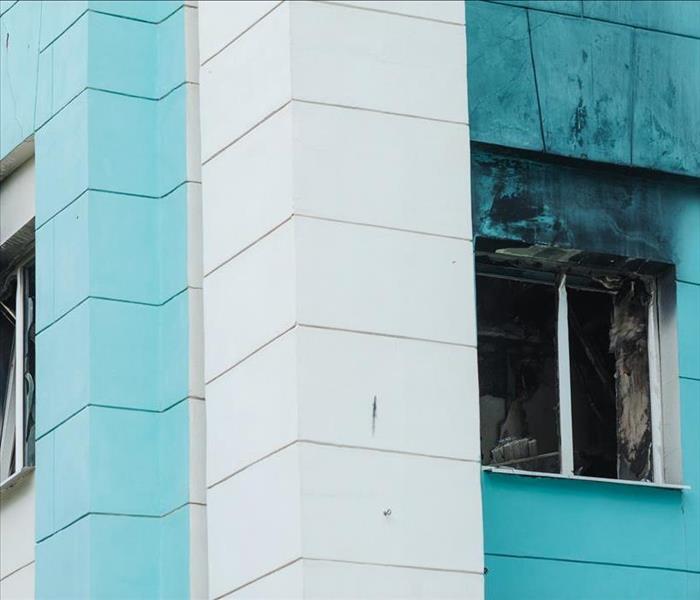 Building damaged by fire in Waterloo, OK
Building damaged by fire in Waterloo, OK
Tips To Clean Correctly Your Contents After A Fire
Removing smoke damage, soot and odor from upholstery, carpets, curtains and other items in your business is a critical part of cleanup after a fire and may require a combination of dry-cleaning and wet-cleaning techniques. Follow these tips to make sure the contents of your business are cleaned correctly after a fire.
1. Handle Soot Removal With Care
All soot must be removed from smoke-damaged contents before they can be cleaned and deodorized. Soot is oily and stains easily, so steer clear of wet-cleaning methods. Avoid the temptation to use a brush or rag, as you risk rubbing the soot deeper into the fabric. A restoration professional will use a high-powered vacuum to remove as much soot as possible before cleaning begins.
2. Leave Content Cleaning to the Pros
Restoring smoke-damaged contents requires expert knowledge of the proper cleaning method(s) and may also require special equipment, making it nearly impossible to complete on your own. It’s best to hire a professional restoration company in Waterloo, OK, with content cleaning experience and access to the necessary equipment and facilities. A good restoration company should be capable of various dry-cleaning techniques, such as dry foam and ozone treatment, as well as a number of wet-cleaning methods. An ideal company will also have ultrasonic-cleaning equipment and immersion-cleaning capabilities.
3. Consider a Pack-out for Severe Damage
If the fire damage to your business requires lengthy repairs, a “pack-out” may be a good choice. This involves packing up your business contents and moving them to another location. Smoke-damaged items will be cleaned and deodorized off-site, and the clean contents will be inventoried and secured in a content storage facility, so that they aren’t damaged or re-soiled during the repairs.
A business fire can feel devastating, but many items can be fully restored with the right combination of wet-cleaning and dry-cleaning methods. Hiring a reliable restoration company is the safest way to eliminate evidence of smoke damage.
Picking the Right Smoke Detector for Your Home
9/25/2020 (Permalink)
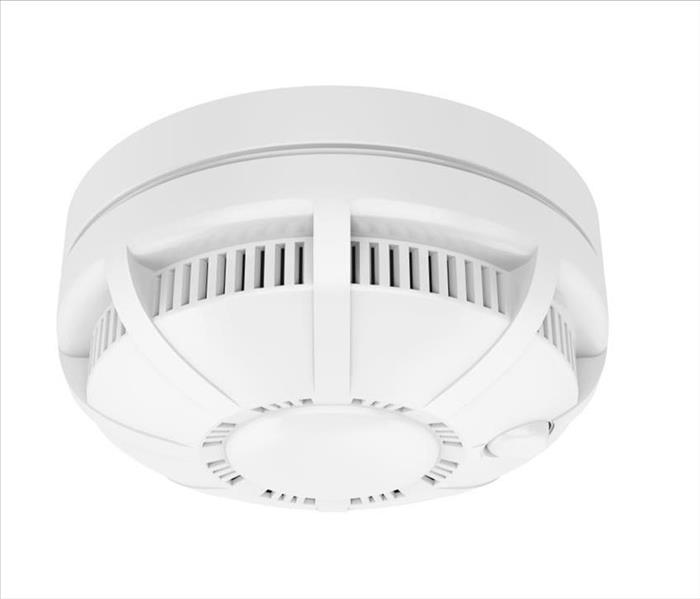 Ionization alarms detect quick-moving fires, such as those caused by paper or grease
Ionization alarms detect quick-moving fires, such as those caused by paper or grease
Take The Following Considerations When Purchasing a Smoke Detector
You probably know the importance of smoke alarms. A working smoke detector increases the odds of you and your family escaping your Oklahoma City, OK, home during a fire. Alarms can also notify you of a small flame on the other side of your house. This may allow you to extinguish the blaze before it causes extensive harm that necessitates fire cleanup and restoration services.
However, choosing the right smoke alarm can sometimes be a challenge. You need reliable detectors that also fit your family's specific needs. Below are some factors to consider when picking your alarms.
1. Type
There are two main types of smoke detectors. Ionization alarms detect quick-moving fires, such as those caused by paper or grease. Photoelectric alarms, meanwhile, are best at detecting slow fires from clothes or electricity.
Ideally, you should purchase both photoelectric and ionization alarms for your house. Since ionization detectors are more sensitive, you may want to keep them away from the kitchen. Otherwise, they could get triggered by smoke from cooking.
You can also install a system that connects all of the detectors. This way, if one smoke alarm goes off, all of them will beep.
2. Convenience
With your busy lifestyle, you don’t want to spend excess time working on a smoke detector. You should thus choose a model that is easy to maintain. If you opt for a battery-powered detector, pick one with drawers that make it easy to change the batteries. You may also want to find an alarm with a removable cover that simplifies the cleaning process.
3. Certification
Finally, pick a detector that has been testified and certified by a respected agency. Alarms that have an "FM " or "UL" label must meet certain standards.
You should take all of the above considerations into account when picking each smoke alarm for your home. By choosing the right detectors and following basic fire safety rules, you can protect both your house and your loved ones.
4 Tips for Staying on Top of Your Fire Claim
6/4/2020 (Permalink)
4 Tips for Staying on Top of Your Fire Claim
The aftermath of a fire can be overwhelming, especially as you stare at the remnants of rooms that used to bring such joy and peace. In the midst of this sadness, though, you can seek assistance, filing an insurance claim for financial compensation. Fire restoration, then, could begin picking up the pieces. Follow these steps to stay on top of your request.
1. Dial Your Agent
Your first step is speaking with your insurer, requesting additional information on fire insurance claims. During this conversation, inform the agent about your situation, and discuss the necessary steps to receiving compensation. By the end of the call, a claim should be opened. Write it down for future reference.
2. Protect Exposed Areas
The flames possibly opened up holes in the walls or broke windows, leaving the premises exposed to animals and intruders. Agencies mandate that you must secure the land; therefore, you'll want to board up these areas. Fire restoration companies in Luther, OK, can assist you with this situation.
3. Don't Touch Anything
Do not try to scrub the walls or the carpets. While hard, it's necessary in order to avoid additional contamination or destruction. While you wait for professional aid, you can protect flooring by covering it with clean towels or carpets. You can empty the pantry and closets of food, medicine and cosmetics. The heat can ruin the contents. Stay away from electronics, and maintain clean hands. Once you've gained insurance approval, a remediation team can use high tech equipment to complete smoke cleaning.
4. Gather Evidence
You'll file an insurance loss form. Walk around the home, inspecting all areas. Take photos of anything ruined, even the small personal items. Make note of the brand name, the initial cost, and the price for replacement. All of this should then be emailed to your agent who can use it to total the value of the claim. In addition, the remediation team can provide an estimate for repair, noting any problems with structure or systems.
Fire restoration is a structured process. Make contact early with your agency. Then, safeguard your house and record your restructuring needs.
3 Things To Understand About Fire Sprinklers
5/18/2020 (Permalink)
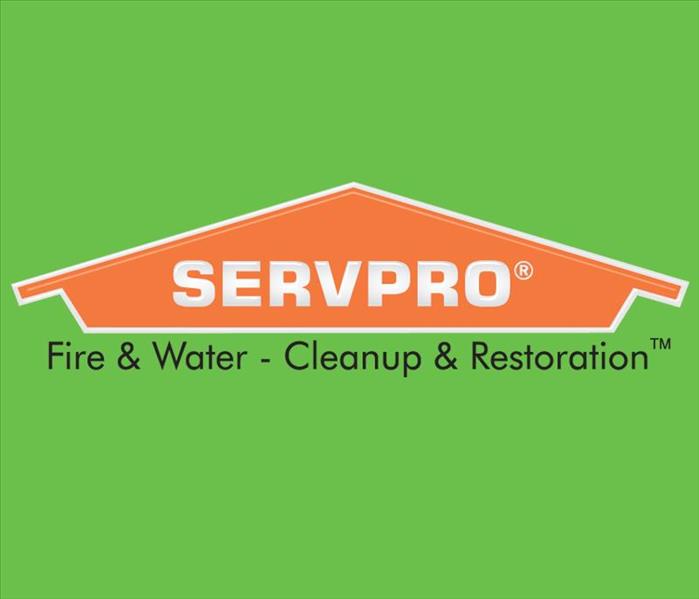 When choosing a fire sprinkler system for your company consider what operation style works best with your business.
When choosing a fire sprinkler system for your company consider what operation style works best with your business.
When choosing a fire sprinkler system for your Oklahoma City, OK, business there are a number of factors to consider. From style and suppression method to the activation zone, here are a few things you may want to know.
1. Why There are Different Styles
There are a number of different styles of fire suppression systems. Some sprinklers are designed to pump out water, while others use chemical suppressants. They can also store the suppression in different ways, and trigger with different sensor types. Factors to consider when choosing a system include the average temperature of the area, what kind of machinery you use in the building, and the size of the space. A professional can help you choose the best fire suppression system for your business.
2. How They Work
A fire sprinkler system can work in a number of ways depending on the style you choose. The most common method involves the detection of heat. This is usually done either with a bit of metal with a low melting temperature, or a glycerin-liquid filled glass bulb that expands when hot. Most sprinkler heads work individually meaning only those over a hot enough area will trigger. One of the head triggers is sprayed water or suppressant from the connected pipeline.
3. How They Activate Over the Fire
When looking at sprinkler systems you may want to check how they activate over the affected fire area. While most systems activate over areas that reach a specific heat, some can be designed to cover an entire room. Depending on the style you choose different types of cleanup may also be needed after the sprinklers activate. Fortunately, a local fire damage restoration service can help with fire sprinkler cleanup.
When choosing a fire sprinkler system for your company consider what operation style works best with your business. You may also want to think about how and where they will activate in the event of a fire. Remember, after the fire is out a restoration service can help with cleanup.
How Clean Your Dryer Vents in 3 Easy Steps
2/28/2020 (Permalink)
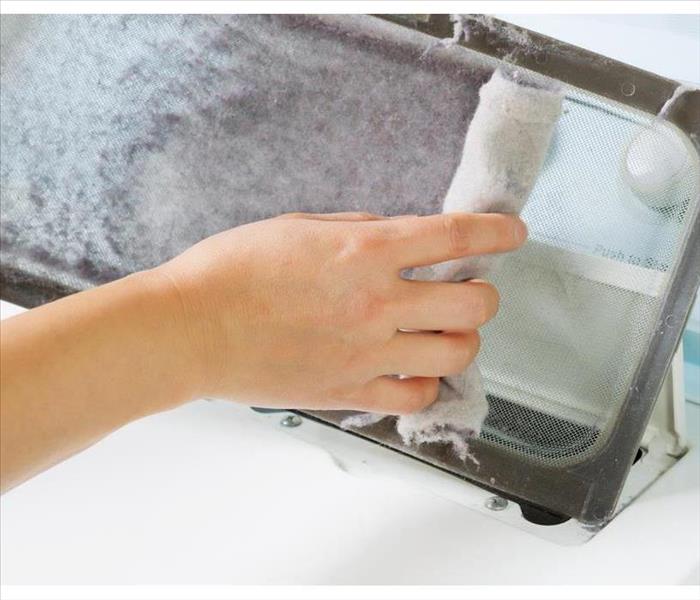 Unblocking the lint screen is the most important step towards preventing a dryer fire
Unblocking the lint screen is the most important step towards preventing a dryer fire
Basic Steps In Maintaining A Dryer
A well-maintained dryer offers many benefits to its owner. The heating elements last longer, clothes dry faster and you get to avoid a lint fire. It is also worth noting that dryer maintenance is a DIY level project that requires only a few minutes to complete.
Here are the basic steps to maintaining a dryer that every homeowner in Edmond, OK should know
Cleaning the Lint Screen
Doing a deep clean of the vents
Completing a deep clean of the interior
1. Cleaning the Lint Screen
Unblocking the lint screen is the most important step towards preventing a dryer fire. Grab the screen and pull it out until it’s fully extended or entirely removed. Then use soap and water to clean it until there’s no more blockage. While you’re at it, vacuum the empty lint trap to get rid of any debris before inserting the lint screen. This process should be repeated after every use to avoid fire damage.
2. Doing a Deep Clean of the Vents
First of all, disconnect the dryer from power then use a screwdriver to loosen the clamps that attach the vent to the exhaust. Use a cleaning brush to remove the lint balls in the pipe. Then snake the wall vent before reassembling the appliance.
3. Completing a Deep Clean of the Interior Dryer
Clean the dryer interior every six months to prevent nasty surprises. You’ll need to unplug the dryer then open the back panel so you can vacuum the interior. The idea is to rid of any dirt, lint, and debris that may affect the machine’s performance or cause a lint fire.
There’s nothing more painful than realizing you could have easily prevented a house fire. A lint fire is one of those situations that can be avoided by regular DIY maintenance. So, make dryer cleaning a habit and also share this info with friends and family.
Smoke Alarm 101: Knowing When to Change the Batteries
11/22/2019 (Permalink)
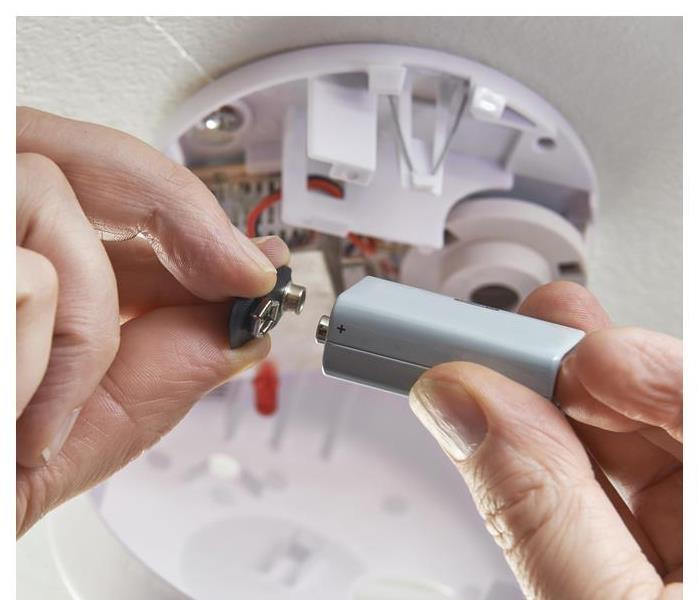 Change your alarm batteries on time
Change your alarm batteries on time
Smoke Alarm 101: Knowing When to Change the Batteries
Smoke alarms are among the most common ways to prevent home fires. But these potential saviors are only useful if they’re working – and too often they aren’t. The top reason is dead batteries. When should you replace the batteries in your home fire alarms? Here are a couple of pointers to guide you on handling the alarms in your Oklahoma City, OK, home.
About Fire Alarms
Public awareness efforts have transformed smoke detectors and fire alarms into one of the most common prevention tools in the average home. They’re easy to use and effective against stopping fire damage or worse. But for every one that is functioning, there are others that aren’t. As a result:
- Home fire deaths happen most often when there are no alarms or non-working
- Of fires in homes with alarms that failed, about half were due to missing batteries
Know Your Battery
Today’s smoke alarms often are powered by lithium batteries or 9-volt batteries. A lithium-powered alarm won’t need a new battery for a decade. But a 9-volt needs annual replacing. Do it when you set your clocks back and you won’t forget.
Don’t Ignore the Beep
Most homeowners are familiar with the annoyance of a falsely beeping fire alarm. Don’t ignore the sound. A beeping alarm is a sign your alarm is running low on juice. So, heed the beep and replace the battery.
Know Expiration Dates
The average smoke detector will function properly for eight to 10 years. After that, you’ll need to replace it. Keep a log of the age of your device. You should also look at your device manual to determine if your alarm needs more frequent replacement.
Smoke alarms have drastically reduced the impact of house fires. But they must be used properly to protect your home. Change your alarm batteries on time, every time and minimize the risk of damage and expensive fire cleanup in your home.
Tips for Preventing a Hotel Fire
10/9/2019 (Permalink)
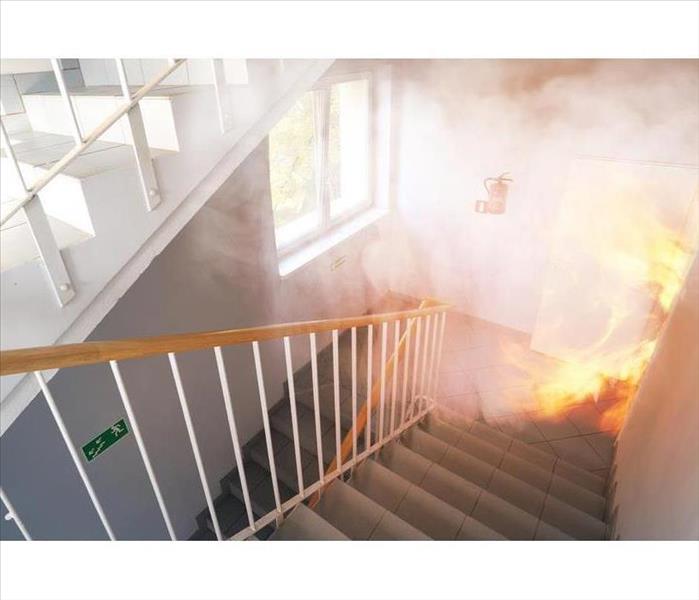 Fire in a Waterloo, OK building
Fire in a Waterloo, OK building
Being a hotel owner in Waterloo, OK, comes with its own set of responsibilities and stresses, one of the most important of those being the safety of your hotel guests. From physical building safety features to on-staff security guards in unsafe locations, and proper building maintenance, there are many legal requirements you must meet in order to be up-to-code as a commercial building and consumer-oriented business.
Fire Prevention
One of the most vital categories of safety you should be well prepared for is fire prevention. Especially with large numbers of people staying at your establishment, a hotel fire is one of the last things you would probably like to experience. By putting the right things in place ahead of time, you can have more peace of mind that you can handle any hotel fire incident without widespread damage.
- Fire risk assessment: This includes identifying major hazards such as damaged appliances and obstructed ventilation system, as well as potential fire contributors including furniture and chemicals. It’s important to put the most vulnerable people in rooms that are easiest to evacuate from. Put checks into place for examining high risk areas and items that are ready to wear out and keep paperwork for local fire authorities, as they do check hotels and issue fines or warnings for code violations.
- Staff training: Someone on your staff will need to be trained more extensively than the rest of the staff on hotel fire safety. The size of your hotel will determine how many individuals need to have this training.
- Alarm and sprinkler systems: Legally, hotels must have well-maintained alarm systems, and some may also require sprinkler systems.
- Fire evacuation plan: Your designated fire route should be constructed with fire and smoke resistant materials, include emergency lighting, signs, and ventilation, and be obstruction-free.
- Guest information: Depending on your state, there may be differing laws governing what type of information you must provide to your guests in the case of an evacuation. Many hotels have pamphlets in each room or evacuation maps on guest doors.
Hotel Restoration
If you do experience a hotel fire that causes structural damage, consult with a fire restoration company. They are well-equipped to do everything necessary to ensure your insurance claim is accepted, including properly cleaning the damaged area, establishing safety perimeters, and fixing your building up quickly so your business is interrupted as little as possible.
When To Do Maintenance on Your Furnace
7/17/2019 (Permalink)
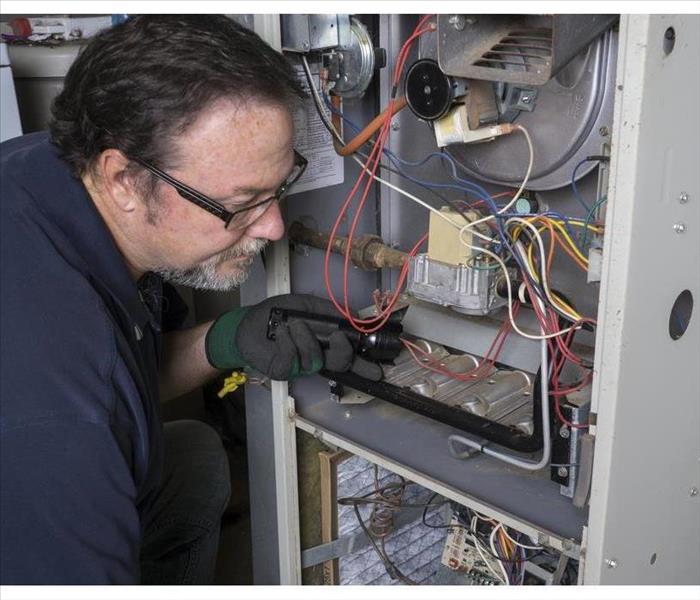 Furnace repair
Furnace repair
Preventative fire cleaning on your home furnace in Waterloo, OK, is important to ensure it functions correctly and doesn’t cause fire damage. While many people suggest hiring a maintenance professional to inspect annually, there are some things you can do yourself as well to ensure you system runs efficiently.
Replace Filters Regularly
Dirt can be a big problem for heating and cooling systems, by lowering efficiency and burning extra fuel. Keep the system clean by vacuuming around the unit regularly and changing the filter monthly or whatever time-frame is recommended by the manufacturer.
Leaving old filters to sit for too long will add stress to the compressor and can eventually result in mechanical failures. Not only that, the dirt and debris will get recirculated through your home which can cause allergies and disease. It’s also important to do additional fire cleaning on heaters, radiators, and warm-air registers, while also ensuring they’re not blocked.
Maintenance Before Cold Weather
Many homeowners call a professional to do a yearly inspection and fire cleaning on their furnace before the heating season to confirm the system is clean and performing in the most efficient way possible. Here are a few steps you can take yourself to keep your bills low while staying warm:
Calibrate the thermostat. The correct calibration can be lost from excess dirt or being moved around. A furnace maintenance professional can check this annually, or you can replace it with a computerized one.
Clean and adjust the burners to improve efficiency, and check for any rust accumulation.
Reverse ceiling fans to a clockwise rotation to help push warm air down, especially if you have tall ceilings.
Seal any air leaks and all air ducts, especially in the attic or crawl spaces. Metal tape and insulation can temporarily save an aging duct system.
It’s good to get into the habit of allowing a professional to service your furnace once per year. Waiting until the end of the heating season (the off-season) may give you faster service at a slight discount. If you have endured some home damage due to a furnace issue, smoke cleaning and remediation services are available that can usually clean up the mess to almost as good as new.
Three Steps to Take Immediately After a Building Fire
6/26/2019 (Permalink)
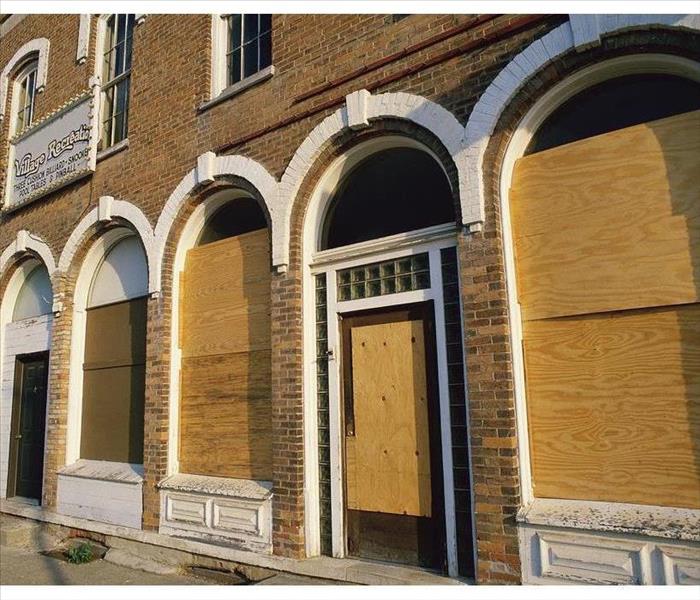 Boarding up windows and doors may help to keep intruders out of the business
Boarding up windows and doors may help to keep intruders out of the business
What to do After Sustaining Fire Damage at a Commercial Building
A destructive fire can be disastrous for a company. If a fire occurs in a commercial building in Oak Tree, OK, there are important steps to take immediately after the blaze is extinguished. Here are three suggestions for what to do after sustaining fire damage at a commercial building.
1. Secure the Building
After a fire is doused, other problems may unfortunately occur, including looting. Once it is safe to do so, it may be beneficial to secure the building to help deter any thieves from gaining access inside the property and stealing valuable items. Boarding up windows and doors may help to keep intruders out of the business. And if it is safe to enter the building after a fire, consider removing as many valuable items as possible that are salvageable. At a business, these items may include computers, hard drives, various electronic equipment, as well as important files and paperwork.
2. Repair the Damage Swiftly
Fire cleanup and property repair is a top priority. It is important to work with professionals who specialize in fire restoration and repair in order to fix the damage caused by the blaze. Fire damage may cause major structural damage to a commercial building, and ensuring that it is safe – especially for employees to return to work at the business – is vital.
3. Plan for a Road to Recovery for the Business
A fire at a business may result in a loss of revenue for an extended period. Coming up with a plan to handle the possible financial hardship that may follow a disaster is critical. This plan may include relocating employees to a temporary office building or allowing them to work from home so that the company can still operate.
Fire damage can be devastating, but it does not have to destroy a company. Following these tips and addressing the situation in a timely manner may help a business to resume operations quickly.
To Prevent Home Fires, Try Candle Alternatives
5/17/2019 (Permalink)
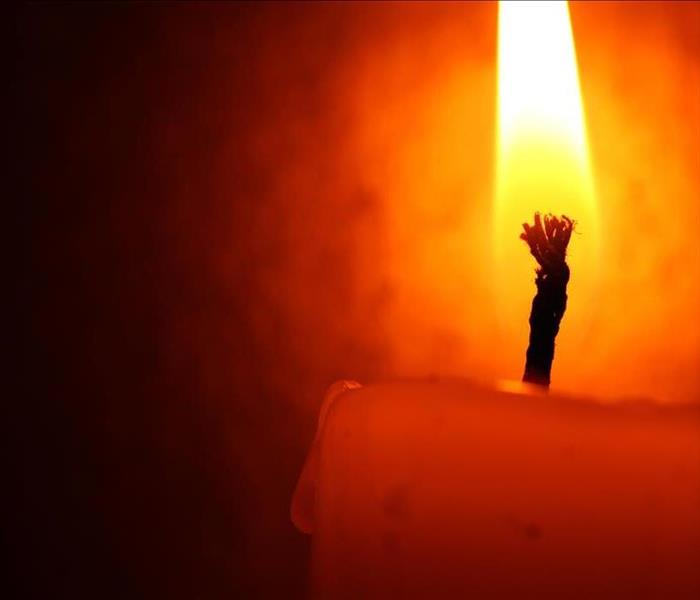 Never leave a lit candle unattended in your Arcadia,OK home
Never leave a lit candle unattended in your Arcadia,OK home
The glow of a candle is a welcoming site. People love to place dozens of them around the bathtub, on the fireplace and many other places to enhance their home’s ambiance and spread inviting aromas. But candles can have a down side as well, being responsible for over 15,000 fires each year. The risk of candle fire can be greatly minimized by using some of the candle alternatives that are available for home use.
Popular Alternatives to Traditional Candles
- Candle warming lamps that melt the wax with the heat of a light bulb
- Flameless luminaries that use a small light bulb and essential oils
- Wax cakes that slowly melt in an electric pot
- Battery operated candles or tea lights; some have remotes
- Twinkling fairy lights, threaded through a wreath, hanging free or in a decorative jar
In addition to replacing the flickering flame of a candle, some of these candle alternatives can also diffuse pleasant aromas in your home. None of these options should be left unattended, however, because fires are still possible where there is a heat source and wax. However, many of them are interchangeable with most applications where candles are used, especially if there are children or pets in the home.
Use With Caution
If you must burn candles, do so with the utmost of caution. Avoid placing candles with open flames in centerpieces or garlands made of flammable materials. Never leave a lit candle unattended. Candle fire can cause smoke and fire damage and wreak havoc on your home. In the event you experience a blaze, a fire remediation service in Arcadia, OK can be very helpful in dealing with both the smoke damage and fire cleanup process.
Candle alternatives can work well both for the purposes of ambiance and for dispersing a great smell. You can find most any type on line or at your local department store. Using them can give you one less thing to worry about and help keep your home a safer place.
What To Expect During the Fire Cleanup Process
4/27/2019 (Permalink)
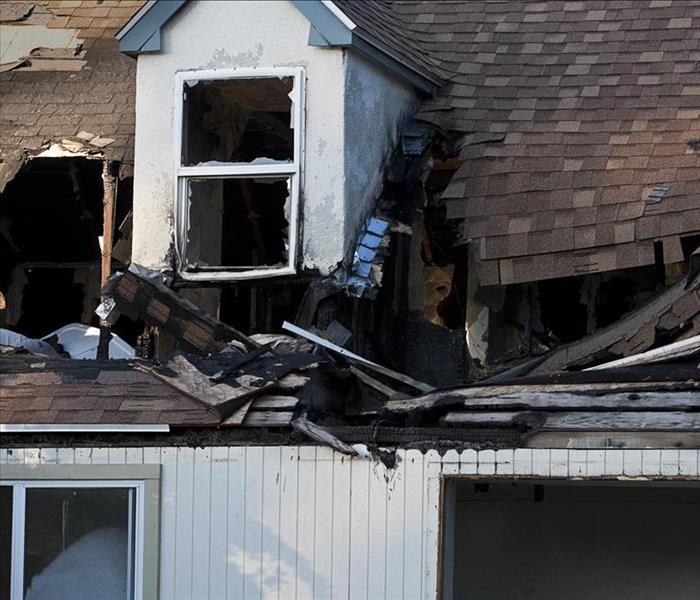 Professional Fire Restoration Experts can take some of the burden off your shoulders by repairing Fire Damage caused to your home or business.
Professional Fire Restoration Experts can take some of the burden off your shoulders by repairing Fire Damage caused to your home or business.
If your home has recently sustained smoke damage or soot damage, it’s important to call fire restoration experts in Edmond, OK. Unless you have professional tools and expertise at your disposal, it can be nearly impossible for you to effectively get rid of the damage and odor on your own.
Wondering what happens during the typical smoke cleaning process? Here’s what you can expect.
- Thorough Inspection
Before beginning the cleanup and restoration process, professional fire restoration experts will first thoroughly inspect the damage and make an assessment. Once this process is complete, a plan of action can be created.
- Board-Up Services
Fire damage frequently breaks or damages windows, doors, walls and roofs. When these crucial exterior elements are damaged, they expose the interior of the home to the elements. During the professional smoke restoration process, board-up services are provided as needed to maintain security and prevent damage.
- Water Removal
If the fire in your home was put out with water, there is probably still residual moisture in your home. Fire restoration services remove excess water and dry the area with professional-grade air movers and dehumidifiers to minimize water damage.
- Smoke Removal
Smoke damage can be stubborn and pervasive. Fortunately, fire restoration professionals have specialized equipment that can remove soot and smoke from various surfaces in the home.
- Cleaning
Once water and smoke have been removed, professional cleaning services can be performed. During this process, indoor structures and belongings are cleaned with various techniques and products. Even odors are removed with the help of industrial fogging equipment and air scrubbers.
- Restoration
The final step to restoring smoke and fire damage is restoring all areas that need it. As part of the restoration process, new carpet may be installed and drywall may be replaced.
As you can see, it would be practically impossible for a homeowner to do all these steps alone. If you’re feeling overwhelmed by smoke damage in your home, take some of the burden off your shoulders by letting professional fire restoration experts repair the damage.
OKC Fire and fire damage cleanup Information
2/20/2019 (Permalink)
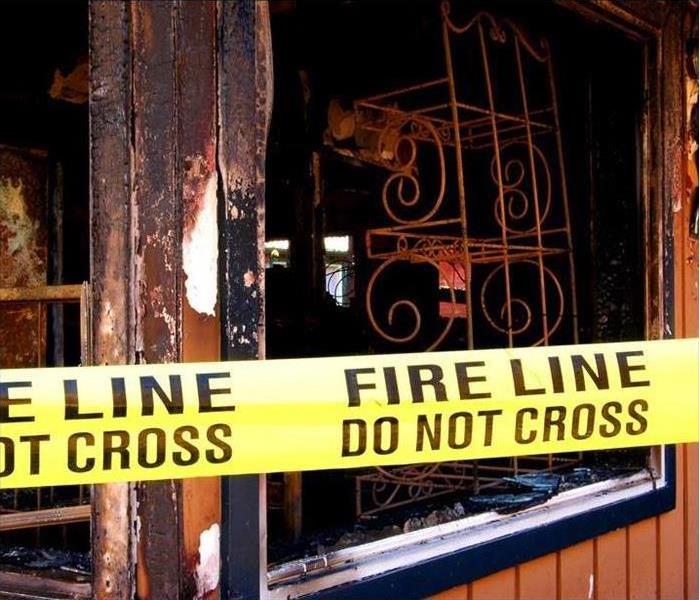 Smoke can contain pollutants, toxic chemicals that can cause serious illness and even death.
Smoke can contain pollutants, toxic chemicals that can cause serious illness and even death.
The Details of Fire Damage and Smoke Damage Cleanup
Unlike the flames of a house fire, the smoke that is produced is almost impossible to contain. It can pollute areas of your home that were never burned and its odor can linger for years if not properly remediated. Smoke can contain pollutants, toxic chemicals that can cause serious illness and even death. While the cleanup after fire damage may appear to be a simple process, the average homeowner will simply not be prepared for much of what this task entails.
About Smoke and Fire Damage
The nature of smoke will differ depending on the material that produces it. For example, when wood is combusted, the type of smoke it produces is different from plastics that have been combusted. Each type of smoke leaves its own kind of residue and the different types of residue may react differently to cleaning chemicals. Anyone cleaning up smoke and fire damage should know which chemicals to use or they risk worsening the property damage. The wrong chemicals can have the effect of sealing the smell into carpets, walls and ceilings instead of deodorizing the home. This kind of damage often occurs when homeowners attempt to clean up their fire-damaged home on their own. The damaged items will not be restorable, they will need to be discarded and replaced.
Benefits of Professional Smoke and Fire Damage Cleanup
Correct Equipment
Equipment like ozone generators can be used to get rid of the smoke odor in your fire-damaged home and restoration professionals will have access to these machines along with the training needed to use them safely. Note that ozone gas can be dangerous if it is used incorrectly.
Effective Soot Removal Methods
Soot is one of the byproducts of smoke. It is oil based and can be a magnet for dirt when it gets into carpets, curtains and upholstered furniture. One of the most important first steps when cleaning up smoke damage is to remove the soot, which can be difficult. Special methods and tools will be needed to avoid grinding it even further into the fabric. Use of a standard household vacuum cleaner may make the problem worse. A professional restoration company will have the equipment and training to perform effective soot removal and to restore your belongings to their preloss condition.
Safety Gear
Restoration professionals will be aware of the risks associated with smoke. They will have protective clothing and equipment to protect them from toxic residue that may include carcinogens like benzene and formaldehyde.
Cleaning up smoke and fire damage is not something that you should try to handle yourself. While you may be able rent some of the tools needed, these will be very different from those that the professionals use. Aside from the risks to your health and to that of your family, there are numerous steps necessary for smoke damage restoration to be performed successfully. If you need to learn more about restoration after a fire or need to know which restoration company to use, your insurance agent will be able to help.
4 Tips for Space Heater Safety
2/4/2019 (Permalink)
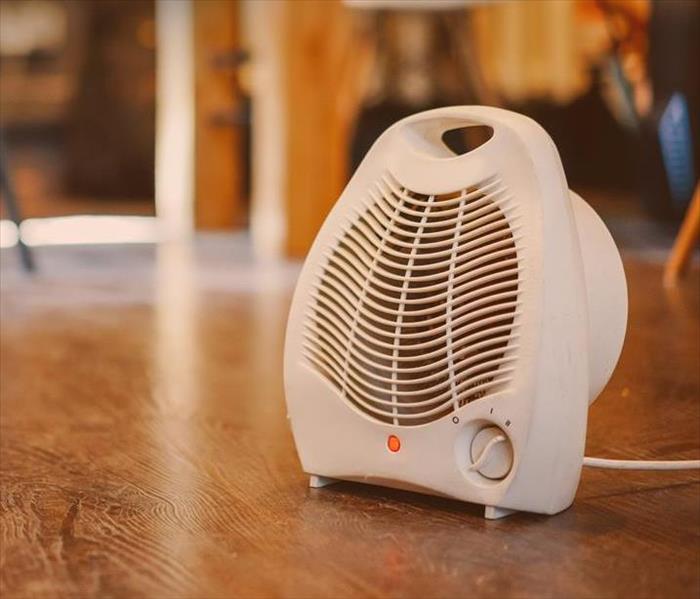 Turn off your space heater when it's not in use
Turn off your space heater when it's not in use
Nothing is cozier than a little extra warmth on a cold night, but the peril of a burned space heater can turn relaxation into aggravation in a hurry. Many fires in Arcadia, OK, are started every year by space heaters, and these fires could have been avoided if the owners used the heaters correctly. Here are four tips for getting extra warmth without extra worry.
Placement
Portable heaters are designed for a specific type of placement. There are several criteria to consider when choosing a surface for your heater. The surface should be:
- Non-flammable
- Level
- Stable
- Near an outlet
Any device that generates heat should sit on a surface that can withstand it. Place it on the floor rather than on a table so that it is less likely to be knocked over. It should also be near enough to an electrical outlet that plugging it in does not stretch the cord.
Power
The simplest way to avoid a burned space heater is to turn it off when it’s not in use. It also helps to purchase one with an automatic shut-off feature in the event that it gets turned over or accidentally covered up. Make sure the power outlet is not overloaded, and the cord is intact.
Preservation
Proper maintenance is important for safety. Your space heater should never be used when its filter is dirty. If filter lint catches fire, you are going to need smoke cleanup from fire restoration professionals. Clean or change the filter regularly.
Proximity
Your heater needs both space and attention. Keep pets and children at least three feet away from it. It should not be used near anything flammable. Only keep the space heater on while you are in the room with it.
A burned space heater can cause damage to your home and negate the relaxed atmosphere it is intended to create. By following these safety tips, you can enjoy the warmth without the stress.
How Many Fire Alarms Do I Need in My Home?
12/30/2018 (Permalink)
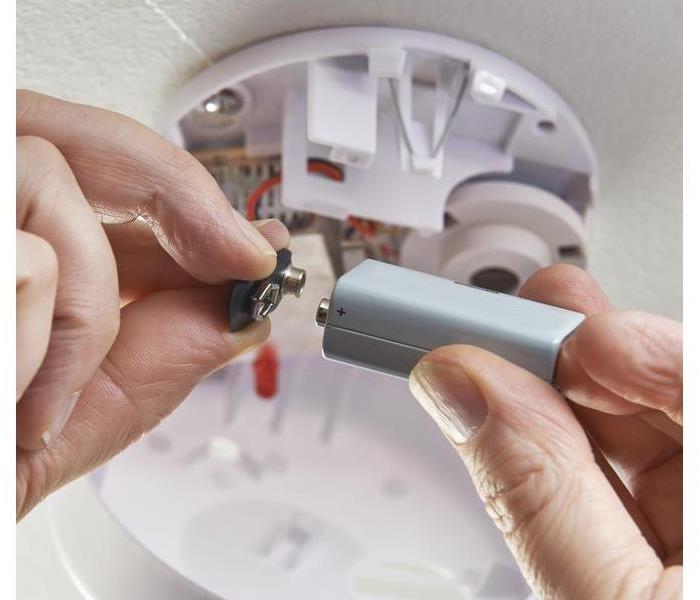 A fire alarm is an essential safety device in your Arcadia, OK home
A fire alarm is an essential safety device in your Arcadia, OK home
The quantity depends on the size and layout of your home. You can ask your friends and neighbors for an opinion, but the answers will all be different; however, the National Fire Protective Association recommends fire alarm placement:
- In every bedroom
- Outside the sleeping areas on all bedroom levels
- On all levels of the home including the basement
- At the bottom of stairways, including the basement stairs
What Type of Smoke Alarm Do I Need?
Ionization smoke alarms are best at detecting hot, fast-moving fires. Photoelectric smoke alarms are best at detecting slow-burning smoky fires. If both are available, get some of each and take advantage of both technologies. If a fire alarm with both sensors is available in Arcadia, OK, install those throughout your home.
Should My Smoke Detectors Be Connected?
Connecting smoke detectors is always a good idea. If there is a fire in your home, you want to know about it right away. Early notification of a fire minimizes fire and smoke damage. You don’t want to wait until a closer detector senses the problem and sounds an alarm.
How Long Does a Smoke Alarm Last?
Every smoke alarm has the manufacture date stamped on the back. When ten years from that date has passed, you should replace that unit. If the manufacturer suggests a shorter replacement interval, follow those instructions.
When Should I Replace the Batteries?
It’s always good to replace batteries on a regular schedule. However, if you are the type of person that only responds to the low-battery beep, change them all immediately.
A fire alarm is an essential safety device in your home. It has a long service life, requires little attention and saves lives. It can keep your family safe and minimize fire damage in your home. Take comfort in the fact that, if you do have a fire, there are fire remediation experts in your area. They have been trained to bring your lives and your home back to normal quickly.
Is It Possible To Get Rid of Cigarette Smoke Odor?
10/23/2018 (Permalink)
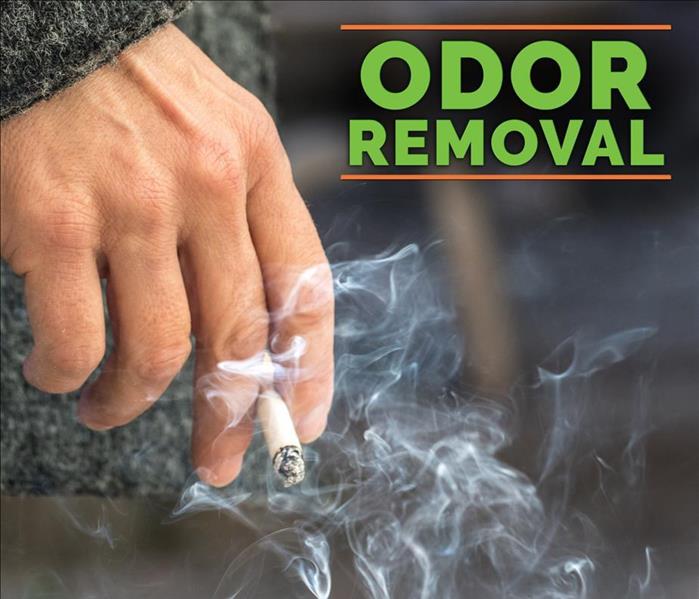 If you want to get rid of smoke odors call odor mitigation specialist in Luther,OK
If you want to get rid of smoke odors call odor mitigation specialist in Luther,OK
Cigarette smoke leaves a sticky residue on hard surfaces. Odor molecules also remain in the air and sink into porous surfaces such as carpet or upholstery. Specialized home deodorization methods for air, non-porous surfaces, and porous materials can eliminate smoke odor.
Removing Smoke Residue From Hard Surfaces
Hard surfaces such as ceilings, walls, and window blinds are suited for dry or wet cleaning methods. Depending on the depth of the residue, an odor mitigation service may rely on
- Chemical sponges for dry cleaning
- Degreasing cleaner for wet cleaning
Chemical sponges are made of absorbent rubber and do not contain chemicals. These sponges can be used to wipe off soot and stains. Scraping the sponge surface with a razor blade reveals a fresh layer for continuing to clean without smearing tar residue. Degreasing cleaner such as Trisodium Phosphate or phosphate-free TSP-PF dissolve smoke residue and eliminate odors.
Deodorizing the Air and Porous Surfaces
Smoke odors may linger in the air or porous surfaces such as carpet, drapery, furniture, or air ducts. The only ways to completely eliminate smoke odors involve the use of professional home deodorization equipment. There are several different machines to choose from:
- HVAC air scrubbers filter smoke particles from the air
- Hydroxyl generators use UV light to produce radicals that destroy smoke molecules
- Ozone machines release ozone molecules that oxidize smoke particles
- Thermal foggers fill the home with fog for 30 minutes prior to ventilation and drying
- Vapor modification disperses an aromatic compound in a mineral oil base to neutralize odors
Some of these methods, such as ozone or thermal fogging, require evacuation. Others may work more slowly, but can be done while residents remain in the house undergoing deodorization.
If you want to get rid of cigarette smoke odors, contact home deodorization experts in Luther, OK. Odor mitigation specialists can recommend the best methods for your residence.
3 Awesome Alternatives to Candles
7/16/2018 (Permalink)
 You do not need to sacrifice your favorite scent or aesthetic for safety when you choose candle alternatives for your home in Edmond, OK.
You do not need to sacrifice your favorite scent or aesthetic for safety when you choose candle alternatives for your home in Edmond, OK.
The power of a scent is indisputable, some aromas relax you while others transport you to another time and place. As you light a scented candle at your home in Edmond, OK, you wonder if the benefits of a lit candle outweigh the fire hazards it poses. Candle fires are a common cause of fire damage in homes, especially around the holidays when candles are commonplace. When homeowners leave candles unattended or in close proximity to towels, curtains or other fabrics the risk of fire increases further. Consider these three candle alternatives to safely enjoy a fragrant home all year round.
1. Battery Operated
There are a wide variety of flameless candles powered by batteries. Some appear physically identical to candles, which is an excellent choice if you enjoy the visual appeal of candlelight. Others use scented wax to provide the olfactory sensation you desire. For an original look, there are battery-powered bases with scented decorative shades as well.
2. Warmers
Continue to enjoy candles without lighting the wicks by using a candle warmer. A lamp light over the candle melts the wax and disperses the scent through your home. Other candle alternatives include oil warmers, which releases fragrances through a battery or electrical source heating scented oil. Wax warmers are similar, by which a heated foundation melts scented wax.
3. Diffusers
Another flameless option is to diffuse a scent, such as by placing reeds in a base of aromatic oil. There are also many choices of battery or electrical water diffusers to use with any essential oil you desire.
You do not need to sacrifice your favorite scent or aesthetic for safety when you choose candle alternatives for your home in Edmond, OK. If you do use a candle, never leave it unattended or place it too close to flammable materials. Should a candle fire occur, immediately leave the house and call 911. Contact a fire restoration specialist and your homeowner’s insurance company to begin the process of restoring your home. For more information, visit http://www.SERVPROedmond.com/.
3 Ways To Prevent Space Heater Fires
5/8/2018 (Permalink)
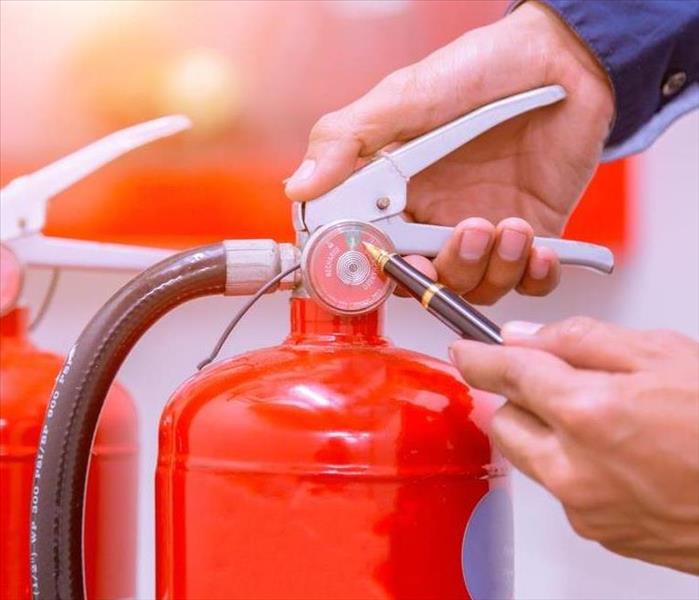 When the cold winter months in Edmond, OK, seem neverending, using a space heater can be a smart option for keeping your home comfortable.
When the cold winter months in Edmond, OK, seem neverending, using a space heater can be a smart option for keeping your home comfortable.
When you live in colder areas of the country like Edmond, OK, finding creative ways to stay warm during the long winter months can be difficult. While space heaters are a great tool for maintaining a warm and happy household, they can be triggers for unexpected fires you may never see coming. Instead of ending up with a burned space heater in your living space, follow these three ways to prevent space heater fires and avoid the leftover smoke cleanup or damage that could result.
1. Keep your space heater away from flammable items around the home. Anything from clothing to curtains, decorations to furniture can become a fire hazard if they’re left near a running heating device. Take precautions by leaving your heater in an open area, with nothing dangling or resting in a close vicinity that can become flammable.
2. Make sure to turn off your heater before going to bed or leaving the home. Space heaters should only be in use when people are around to keep an eye on its use. If you’re planning to leave the home or you and your family are simply going to bed, shutting off your device will help it from becoming a burned space heater. Find one that has an automatic shut-off feature when the device tips over, or when it begins to overheat.
3. Avoid using an extension cord with your heater. If your space heater isn’t reaching you comfortably from its location, using an extension cord might seem like a viable option. However, this can lead to potential electrical issues or even cause someone to trip over and upend the heater, creating a possible dangerous situation. Directly plugging your heater into the wall is key.
When the cold winter months in Edmond, OK, seem neverending, using a space heater can be a smart option for keeping your home comfortable. However, following these three tips can protect you and your family from dealing with a burned space heater that could require professional smoke cleanup down the road. For more information, visit http://www.SERVPROedmond.com/.
Have your property suffered a fire?
2/18/2018 (Permalink)
Professional Fire Damage Restoration Services for Your Property
For property owners, experiencing fire damage is often a very devastating thing to go through. When your property gets damaged from a fire, there are other negative effects that compliment the fire. These include smoke damage, a smoke smell and soot damage.
After experiencing a fire in business or a fire in home, property owners will often be unsure about how to resolve any problems that a fire causes. However, one solution that is among the most effective is getting assistance from a restoration company that specializes in fire damage restoration.
These types of companies will provide a number of services such as fire cleanup. They will also follow a number of safety precautions which often includes a board up of certain areas of a given property. If you ever experience commercial fire damage, using a restoration service company is the first thing you should do after a fire occurs on your property.
Visit http://www.SERVPROedmond.com for more information on fire damage.
Boarding and Cleaning After a Fire
2/18/2018 (Permalink)
Boarding and Cleaning Services
There are a number of ways in which a restoration company that specializes in fire damage restoration can help you. Whenever you experience fire damage, a company will be available to board up your home or business and provide fire cleanup services.
They will also be available to eliminate other things such as smoke damage, soot damage and any left over smoke smell. If you experience damage from a fire in home or fire in business, these companies will also be available to assess the severity of the property damage and give you advice on what to do about it. Companies that restore properties after a fire can also help address commercial fire damage after cleaning it up. They will provide you with feedback and advice on how to best maintain your property and avoid future fires.
Visit http://www.SERVPROedmond.com for more information on fire damage.
Restoring Fire Damaged Homes
2/17/2018 (Permalink)
Fire Damage Restoration Services
A restoration company that provides fire damage restoration can help you in a number of ways. Whenever you have fire damage, smoke damage and soot damage, a company can provide vital assistance which will enable you to overcome the negative effects of a fire.
Restoration service companies will first evaluate your property and check out the extent of the damage. They will then board up the property before engaging in fire cleanup. During this process, they will eliminate soot, dirt, smoke and debris from all parts of the home or business. After getting rid of smoke, its existing smoke smell, soot and debris, these companies will then clean up the property to make sure that it is completely sanitary.
With the help of a restoration service company, property owners will be in position to more effectively address the problems associated with a fire in home or a fire in business. Whenever you experience commercial fire damage, a restoration service company will be your best resource to use.
SERVPRO of Edmond has more services. Visit www.SERVPROedmond.com for more information.
Preventing Fire Damage
2/17/2018 (Permalink)
Preventing Future Damage
Once a restoration company completes the process of fire damage restoration, property owners will then need to do certain things in order to preserve their property. In order to prevent future fire damage, property owners will be instructed to take precautions on a regular basis to prevent another fire.
They will need to avoid using flammable substances and turn off appliances that can cause a fire. It will also be important for them to clean their properties in order to help eliminate and prevent smoke damage, soot damage and a smoke smell. After a restoration service company decides to board up the property, it will be necessary to remove the boards after fire cleanup is complete.
By following a certain maintenance protocol, property owners will be in position to more easily recover from a fire in home or commercial fire damage that results from a fire in business. With your property restored, you will then be able to enjoy being in a safe and clean home or commercial building immediately.
SERVPRO of Edmond has more services. Visit www.SERVPROedmond.com for more information.
What to do after a fire in Edmond, OK
11/21/2017 (Permalink)
Apart from causing physical harm, fire accidents also lead to damage to your property. Smoke and soot are the major culprits when it comes to property damage. So, what happens when you experience fire damage in your Edmond home - do you buy a new home, or do you move out? Well, all these are costly alternatives, but unnecessary. All you need is to have fire damage restoration to make your home as good as new.
What Happens After a Fire Accident?
During fire, a lot of smoke and soot is produced. This is due to the items in your house that burn up. As smoke and soot linger in the air it is deposited on various surfaces in the home. Walls, carpets, appliances, and ceilings begin yellowing, which spoils them. The fire also leaves odor on these items. With prolonged exposure to these elements, it becomes harder to remove them.
Handling the aftermath of fire damage might seem a simple task to you, but it is involving and needs you to hire a professional for quick and efficient restoration.
What Does Fire Damage Restoration Involve?
The focus of the expert is to take your home back to its original state before the fire incident. The specialist undertakes the restoration in a series of steps guaranteed to leave your home free from any smoke damage or soot. Here are the steps:
Post-damage Inspection
The specialist inspects the structure to determine the extent of damage. Your premises are checked for smoke damage and any structural damage. The aim of inspection is to understand the extent of the damage and determine the proper cleaning method.
Protecting Unaffected Areas
Not all items in your home are affected by the fire. There are those that were not touched by the fire or were partially damaged and have to be secured. Before the procedure, the specialist separates the items that can be salvaged and covers them to prevent further losses. Protecting the items prevents any unnecessary expenses.
The Restoration Process
It is up to the specialist to determine the type of restoration to use in your home. The specialist then removes any damaged materials and debris that resulted from the fire. After removal, extensively damaged structural elements are replaced.
During the fire incident, firefighters use a lot of water to put out the fire. The specialist performs water extraction to remove any excess moisture that resulted from putting out the fire. After this, the specialist removes soot, deodorization, and ash. The process culminates in a new paint job.
Final Words
The more you hold on after fire damage, the more costly it becomes for you. You need to use professionals for the process so that you get the best results.
SERVPRO of Edmond is locally owned and operated and serves Oklahoma City, Tulsa, Edmond, Stillwater, Yukon, Bethany, Mustang, Moore, Guthrie, Choctaw, and the surrounding communities
SERVPRO of Edmond's fully certified water removal staff can perform a complete damage assessment to your home of office, and then recommend and follow the industries standards to get your water removal restoration repaired properly available 24 hours a day



 24/7 Emergency Service
24/7 Emergency Service































